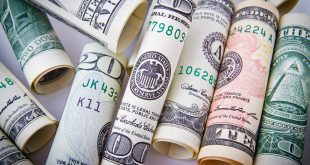With all of this talk of a recession, a flat lined economy and a bust real estate market, notwithstanding the pending sequester budget cuts and major U.S. cities like Detroit filing for bankruptcy protection, the U.S. economy is not nearly as hard hit as one might imagine. Paramount to this notion is the fact that the housing market is healthier than it has been in five years, the stock market nearly set all time records just over the past few weeks, and non-financial U.S. companies added about an estimated $130 billion to their estimated $1.45 trillion coffers this past year alone.
Experts and analysts purport that due to less than lucrative corporate tax loopholes, many companies have been prompted to stash their cash overseas. This estimated amount surpasses 58 percent of the cash that they have, or about $840 billion. A key stoker of this pattern can be found with the popular computer and software company, Apple, Inc., which stashed an estimated $137 billon abroad during the last fiscal year. The trend is very common and prevalent among tech firms.
“U.S. firms, particularly in the technology, healthcare/pharma, and automotive sector have continued stashing cash on the back of tight cost controls, modest economic growth domestically, and a solid performance abroad,” said a recent article that was published by Forbes.
Top Dogs for Foreign Cash Stockpiles
According to an article by Forbes, there are a few companies that take the cake for most dough housed outside of the U.S. “The top five holders, Apple, Microsoft, Google, Pfizer, and Cisco, held $347 billion, or about one-fourth of the total, while earning a spot in the top 50 now requires a minimum of $4.9 billion, up 69% from 2006. And the top 50 are getting richer: by year-end they were sitting on $889 billion, or 61% of the total pie, compared to $784 billion or 59% the previous year,” the article said.
Among the key reasons for this surplus of foreign stowed cash piles, Moody’s said they include: “modest economic growth, the relative strength of performance overseas (with Asian strength offsetting European weakness) and tight cost control).”
More firms are favoring dividend spending, according a report by Moody’s, “The skewing of shareholder returns toward dividends, recently announced dividend increases, and currently higher stock price valuations may reduce the economic motivation of share buybacks.”
What Analysts Are Saying
Some analysts say that the Obama administration has made it increasingly difficult for it to be advantageous for companies to keep their revenue stockpiles domestically, stating in a recent report that “Based on better overseas growth prospects and domestic cash consumption represented by dividends, share buybacks, and the majority of acquisitions, we expect overseas cash balances will continue to grow unless tax laws encourage U.S. companies to repatriate money.”
While foreign firms can keep their cash anywhere they please, and while there are some advantages and benefits to stowing it overseas in the meanwhile, repatriating such monies can be a costly and time consuming endeavor. When the monies return to the homeland, they will be onerously taxed. Whereas when they remain overseas, they represent unbridled and healthy cash flow assets that can be used to encourage and spur growth and stability.
 Invest Smart Asset Protection and Investment News
Invest Smart Asset Protection and Investment News





One comment
Pingback: Christina